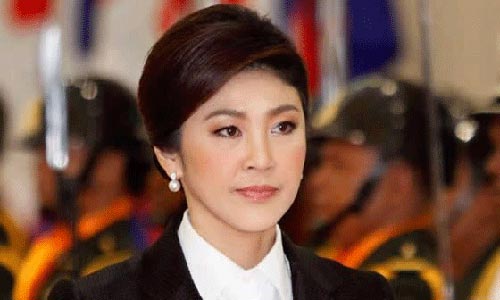
|
Thai anti-government protesters planned to forge ahead on Monday with efforts to topple Prime Minister Yingluck Shinawatra, a day after a disrupted election that is unlikely to settle the country's long-running political conflict. The demonstrators blocked balloting in a fifth of the country's constituencies and say Yingluck must resign and make way for an appointed "people's council" to overhaul a political system they say has been taken hostage by her billionaire brother and former premier, Thaksin Shinawatra. Sunday's election, which the main opposition party boycotted, is almost certain to return Yingluck to power and with voting passing off peacefully across the north and northeast, Yingluck's supporters will no doubt claim a legitimate mandate. But the vote is unlikely to change the dysfunctional status quo in a country popular among tourists and investors yet blighted by eight years of polarization and turmoil, pitting the Bangkok-based middle class and royalist establishment against the mostly poor, rural supporters of the Shinawatras. Apart from a few scuffles, the election was peaceful, with no repeat of the chaos seen the previous day, when supporters and opponents of Yingluck clashed in north Bangkok, with seven wounded by gunshots or explosions. Voting was disrupted in 18 percent of constituencies, 69 out of 375, nationwide, the Election Commission said, affecting 18 of 77 provinces. Neither the result nor the turnout were announced. The disruptions mean it could be weeks before parliamentary seats are filled, so Yingluck will remain a caretaker with no policy authority. Protest leader Suthep Thaugsuban told a crowd of supporters he would lead a rally to a central Bangkok park on Monday. He vowed to press on with his bid, launched in November, to rid politics of the influence of the Shinawatra family. But the vote should offer Yingluck some cheer. "Having gone through more than two months of protests, the election will strengthen Yingluck's position, but her troubles are not over yet," said Kan Yuanyong, director of the Siam Intelligence Unit think-tank. "We'll see a continuation of the conflict, the standoff remains and the likelihood of more violence could increase." The Election Commission said it expected legal challenges to be lodged as early as Monday to try to invalidate the poll and attack the legitimacy of the government POPULIST MACHINE Yingluck said the election was a "positive signal", but a lasting solution was needed. "This election is part of the democratic process," she told reporters. "I hope all sides can help solve each of the country's problems." The protesters say former telecoms tycoon Thaksin has subverted a fragile democracy with money politics and populism, doling out subsidies, cheap loans and healthcare to woo the poor and guarantee victory for his parties in every election since 2001. Thaksin's critics also accuse him of disrespecting the monarchy, which he denies. The anti-Shinawatra demonstrators enjoy broad support from southerners and Bangkok's middle class and are tacitly backed by a royalist oligarchy that sees Thaksin as a corrupt crony capitalist and resents the rapid rise of his political order. Thaksin has lived abroad since 2008 to avoid a jail term for a graft conviction he says was politically motivated. Critics say Yingluck is merely a stand-in for him. Thaksin's supporters accuse the military and the establishment, including the judiciary, of colluding over the years to oust his governments. The military, which has staged numerous coups since Thailand became a constitutional monarchy in 1932, overthrew Thaksin in 2006 but has stayed aloof this time. With several cases against Yingluck and her party taken up by the courts, Thaksin's supporters fear judges might intervene again and they have threatened to stage their own protests if the government is ousted, by the courts or the military. Sunday's election was in stark contrast to three years ago, when Yingluck quit her job as a company executive and helped her Puea Thai Party win an election in a landslide, running on the campaign slogan "Thaksin thinks, Puea Thai acts". |
据路透社2月3日报道,泰国反政府抗议者计划继续努力推翻总理英拉。这是在选举被破坏的一天后,这样的选举是不可能解决泰国长期的政治冲突的。 示威者在全国五分之一的选区阻止了投票,并提出英拉必须辞职,为指定的“人民委员会”让位,以改革政治制度。他们认为,现在的政治制度已被英拉的哥哥他信劫持。他信是泰国前总理,并且是一位亿万富翁。 主要反对党拒绝参加选举。这场选举基本可以确定使英拉重新得回权力,并通过投票,向北部和东北部虚报和平的消息。英拉的支持者无疑将要求合法授权。 但是,在这样的国家,投票是不可能改变这种不正常现状的维持的。泰国在旅游者和投资者之间都很流行,然而八年的极化和动荡使它衰败,曼谷中产阶级塌陷,保皇党与大多数贫困并位于农村的西纳瓦的支持者对立。 除去少数的混战,选举还算和平,没有重复前一天混乱的场景。前一天,英拉的支持者和反对者在曼谷北部发生了冲突,七人伤于枪击或爆炸。 投票在百分之十八的选区被打断,也就是全国375个选区中的69个,选举委员会说,影响到77个省中的18个。投票结果和出席者都没有公布。 中断意味着还需要几个星期才能将议会席位填满,所以英拉仍是没有政策权威的临时代理。 反对者首领素贴·特素班告诉一群支持者,他将会在周一领导一次位于曼谷中心公园的集会。他发誓继续争取,于十一月行动,使政治摆脱西纳瓦家族的影响。 但投票应该使英拉乐观了一些。 “经过两个多月的示威后,选举巩固了英拉的地位,但她的麻烦还没有结束,”泰国智库暹罗资讯社主管康元勇说。 “我们将会看见冲突持续,僵局没有变化,暴力增加的可能性上升。” 选举委员会说,希望能在周一前面临法律挑战,判定投票无效,并攻击政府的合法性。 平民主义机器 英拉说,这次选举是一个“积极信号”,但仍需要一个持久的解决办法。 “这次选举是民主进程的一部分,”她告诉记者,“我希望各方能帮助解决这个国家的每一个问题。” 抗议者说,自2001年以来的每次选举,前电信大亨他信都会用金钱政治和平民主义破坏脆弱的民主。他施舍补贴,提供低息贷款和卫生保健,以吸引穷人,确保他的党派的胜利。 他信的批评者还指责他不尊重君主,但他否认了。 西纳瓦的反对者享受到了南方人和曼谷中产阶级的广泛支持,同时还被保皇党的寡头政治默默支持着。保皇党的寡头执政集团认为他信是腐败的裙带资本主义,并憎恨他的政治秩序迅速崛起。 他信为了避免因贪污罪入狱,自2008年起就住在国外。但他认为所谓“贪污罪”是政治动机。批评者称,英拉只是他的替身而已。 他信的支持者指责军方和当权派(包括司法部)多年来密谋推翻他的政府。军方在泰国1932年成为君主立宪制以来,上演了多场政变,并在2006年推翻了他信,但这一次,军方选择了旁观。 几起反对英拉及其党派的案件将被法庭审理,他信的支持者担心法官再次干预。他们威胁称,如果政府被驱逐,他们将提出自己的抗议,运用法院或者军队。 周日的选举与三年前的场景形成了鲜明的对比。那时,英拉辞去了她公司高管的职务,帮助她的为泰党在选举中取得了压倒性胜利,提出了运动口号“他信思想,为泰行动”。 (译者 凉白开 编辑 丹妮) |
